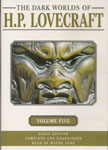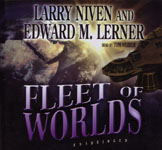
 The Naked Sun
The Naked Sun
By Isaac Asimov; Read by William Dufris
7 CDs or 1 MP3-CD – 8 Hours 30 Minutes [UNABRIDGED]
Publisher: Tantor Media
Published: 2007
ISBN: 140010422X (CDs), 1400154227 (MP3-CD)
Themes: / Science Fiction / Mystery / Robots / Artificial Intelligence / Sociology / Alien World
On the beautiful Outer World planet of Solaria, a handful of human colonists lead a hermit-like existence, their every need attended to by their faithful robot servants. To this strange and provocative planet comes Detective Elijah Baley, sent from the streets of New York with his positronic partner, the robot R. Daneel Olivaw, to solve an incredible murder that has rocked Solaria to its foundations.
[disclaimer- As an audiobook publisher (www.wonderaudio.com), I have a working relationship with the narrator, William Dufris. I have no other professional associations with this title. Although I’ve kept the paragraph about the narration on this title brief, reader’s may question the objectiveness of the review in such cases. On the other hand, just because I have an association with an author or narrator doesn’t negate my reason or enthusiasm for that artist.]
The Naked Sun is a sequel to The Caves of Steel. It can be read or listened to without first acquainting yourself the first title, but it’s recommended that they be read in order…(The Caves of Steel was also designated an SFFaudio Essential by a different reviewer).
Like the first book, the main character is Earthman detective Elijah Baley. And he is reunited with robot and assistant Daneel Olivaw. He is sent to Solaria, which is hostile to Earth, to investigate a murder. Asimov takes the setting of The Caves of Steel and flips is on it’s head. In that first book the setting was of a vastly overpopulated Earth living in the confines of gigantic city/buildings. The mere thought of being outside is frightening to Earth’s inhabitants.
In The Naked Sun, Elijah Bailey, is sent to the planet Solaria to investigate a murder. Solaria’s inhabitants live on vast estates alone or with their spouses. They communicate with one another via holographic telepresence. They call this “viewing” versus “seeing.” “Seeing” is when they are in one another’s physical presence. They have a natural aversion to “seeing” and consider it a social taboo. This has additional relevance to our own society, or should I say to our social media networked world. Socially, we have moved closer to the virtual aspects of a world like Solaria than the world of 1956 when the novel was first published in Astounding Stories.
Asimov’s writing style is very clean, sparse and not very stylistic in a literary way. He’s fond of moving the story along with one-on-one dialogue. This is not untypical of the mystery genre and serves the Robot Novels very well. One of William Dufris’ strengths is handling dialogue. And he’s perfect for these novels. His voice characterization are distinctive, and he’s got a gift for pacing a conversation.
The murder mystery is very satisfying and there’s a much larger implication between the future of Earth and the Spacers giving the novel a larger feel than just a murder mystery with a SF setting. I find The Caves of Steel and The Naked Sun to be the best of Asimov’s novels and should be on every SF enthusiast’s list of must listens.
There is another sequel with Elijah Baley and Daneel Olivaw called The Robots of Dawn. This title was written much later in Asimov’s career and is also published by Tantor with William Dufris as narrator.
Posted by The Time Traveler of the Time Traveler Show




